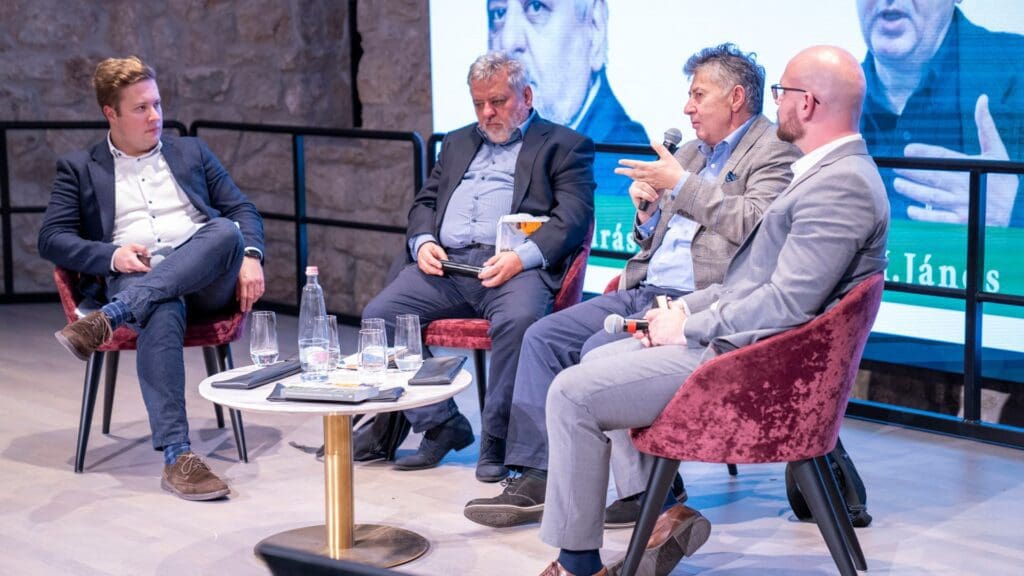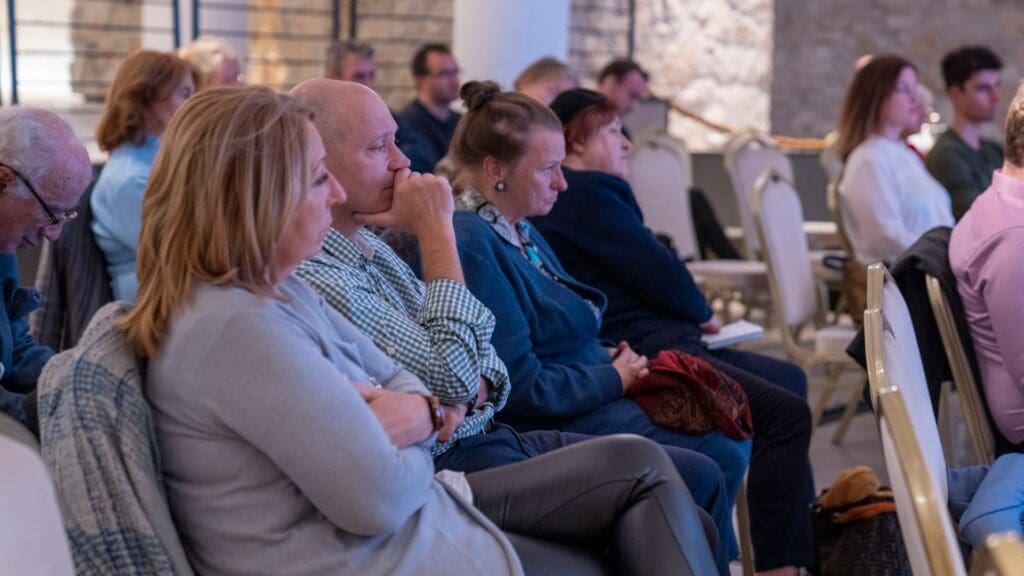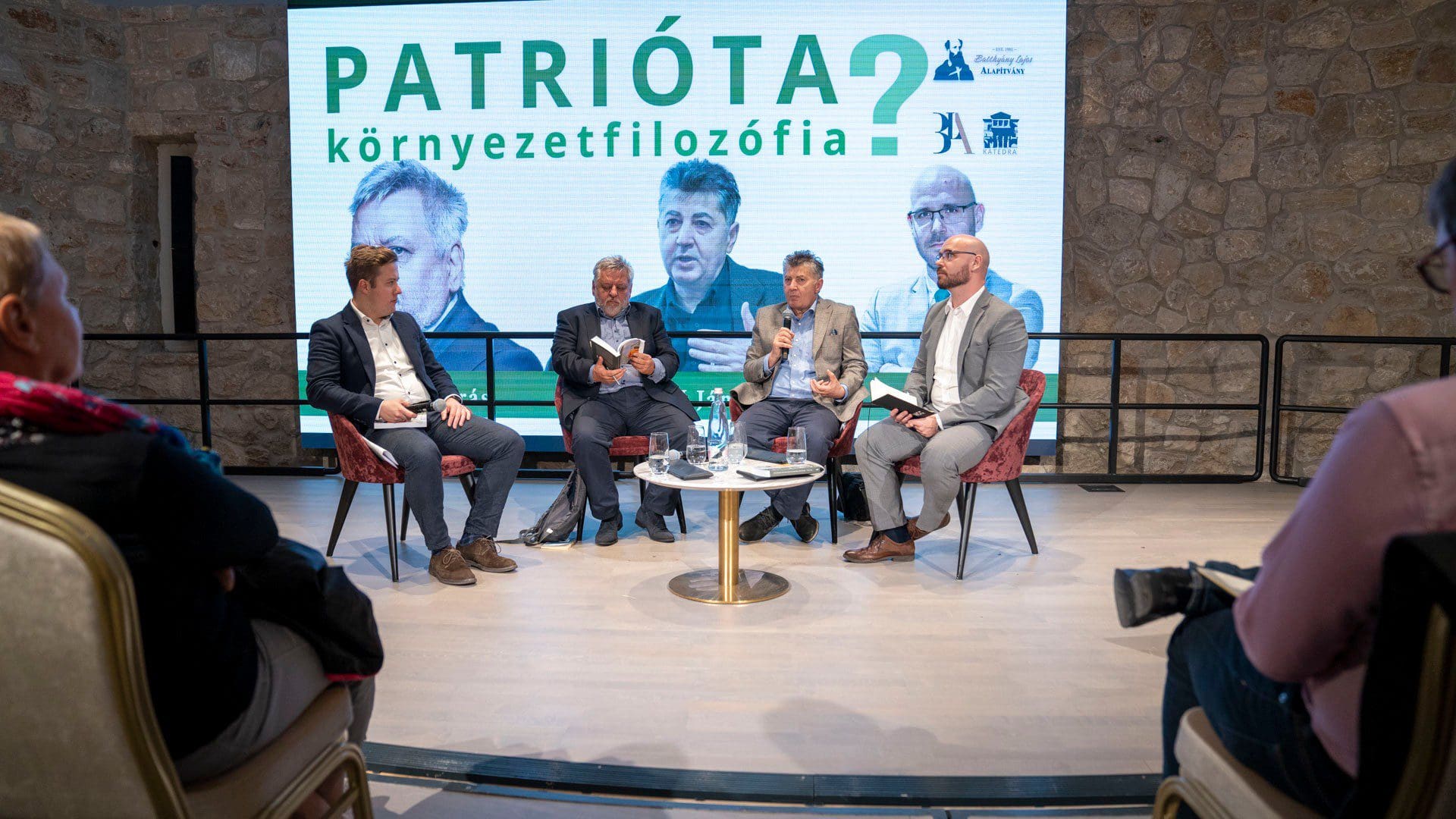On Monday, the conference room of the Golden Bastion Restaurant in the Buda Castle filled up once again as guests were eager to hear about the new book written by János I. Tóth, associate professor of philosophy at the University of Szeged. The event launched the book entitled Ecological Society with a Sustainable Population (Ökologikus társadalom fenntartható népességgel) with philosopher and Corvinus University Rector András Lánczi and Máté Litkei, head of MCC’s Climate Institute joining the author for an exciting discussion moderated by István Pócza, the Batthyány Lajos Foundation’s programme manager.
Building an Ecological Society: Challenges and Opportunities
At the beginning of the discussion Mr Tóth was asked to elaborate on the title of the book, with special regard to the term ‘eco-society’. He said that the phrase is rather trivial and self-explanatory, and he certainly did not invent it. He added that at first, he was thinking of giving a title to the book along the lines of sustainable society but in the end, he decided to include the word ecology. He explained that the central concept of the book is the co-existing of society, economy, and the biosphere. The book delves into analysing the relationship of nature and environment, while looking into local differences and similarities in terms of the biosphere and society. As he put it, both are closed systems and in a rather permanent state. Both affect each other, thus, researching the depth of these effects is imperative.

Reacting to Mr Tóth’s remarks, Mr Lánczi highlighted the connection between ecology, society, and migration. He started off by quoting Nietzsche, adding that these are not new issues, as the German philosopher had already written about them in the 19th century. He pointed out that on the one hand, Mr Tóth’s book does not venture into the field of politics—although some politicians are mentioned and quoted, politics is not part of the discussion. On the other hand, there is a great emphasis on structures above the individual, which according to Mr Lánczi, is the very definition of politics. He noted that the author touches on a number of different topics, creating an effective mosaic-like structure in the book. He reminded that Nietzsche, when talking about migration, suggested that it creates the ‘metabolism’ of society. The key question in all the topics that the book tackles, according to Mr Lánczi, is that humanity seems to be trying to defeat nature, and that is not a good path, we need an alternative.
Mr Litkei remarked in response that he sees ecology as a large circle. Inside this circle there are two smaller circles: first society, then the economy. He said what needs to be worked out is how to fit these circles inside each other smoothly, so that they do not disrupt each other. If that was done, it would give answers to our current problems. He underlined that if something happens to the ecology anywhere, it has a certain effect on society as well—and from that effect economic issues like migration stem. He illustrated the power of these effects using the example of people who live on oceanic islands. As the sea levels rise, these islands start to disappear, thus, those who inhabit them start to look for a new place to live. He added that not only islands, but areas close to the ocean shores are also affected by the same problems. Mr Litkei stressed that because ocean levels are rising due to climate change, humanity needs to find ways to react. In his opinion, technological optimism is necessary to find these new solutions to the dramatic climate developments.
How Green Are Greens Really?
Mr Tóth was then asked about his view on how politics reacts to the sustainability issue, in particular those political parties that consider themselves green. Mr Pócza remarked that overpopulation and migration are also major political issues, and the liberal approach to them is that people should be allowed to migrate wherever they wish in the world, and asked Mr Tóth if there was a conservative approach that was different.
Mr Tóth said that while the issue of overpopulation and migration is indeed global, the liberal solution, which only adopts a global viewpoint, is flawed, as solutions should be devised regionally, according to the specificities of the regions in question. While overpopulation numbers are high globally, if one looks at specific areas, the numbers are quite different. He underlined that for example in Europe and East-Asia, there is an issue of ageing societies, due to low birth rates. In his view, where there is an issue with overpopulation, there should be a two-child limit in the country, and where the numbers are dropping, giving birth should be incentivised. He stressed again, however, that these issues need to be solved locally, not globally.

Mr Lánczi added that he believes that ’a conservative does not harm the environment’. He said that what needs to be discussed and analysed is whether the goals set are the right ones to begin with in terms of environmental protection. He believes that ’putting the brakes on technological advancements’ would be a good starting point. He stressed that the problem of technology growing too rapidly already existed in the 17th century, and while tech advancements brought a lot of good to the world, there are still no real goals associated with them. While in some cases technology is helpful, he remarked, advancing it without set goals in mind is not. Mr Lánczi opined that neither humanity as such nor politics can clearly articulate their goals.
Mr Tóth responded that his book also looks into these issues and expressed the belief that while pure ‘naturism’ is not good, rapid modernisation is also harmful. He said that with modernism, society is also rapidly changing, and is becoming more artificial. Humanity should stick more to conservative values, and continue making changes, however, the changes should be made with the values born in mind and followed closely.
Out with the Old, in with the New?
The speakers were asked about the venue of the discussion, which is an astounding blend of old and new. The Golden Bastion, in fact, used to be an actual bastion at the edge of the Buda Castle, thus, those attending the discussion were sitting in a venue where the walls are over 500 years old, but there is a huge LED wall behind the podium.
Mr Litkei recalled Lánczi’s earlier remark about conservatives not harming nature deliberately. He then gave a practical example to illustrate his point. The bottle on the table in front of him was made of glass, he pointed out, which many believe is environmentally friendly. However, in reality, it is only better for the environment if it gets recycled, because if it does not, then a plastic bottle produces a lesser carbon footprint during manufacturing. He said that the problem of the 21st century man is that we expect ourselves to make the right decision at every crossroad. He then remarked that all those in attendance are sitting in a venue that is heated and well-lit, stressing that those were societal achievements. While it is an utmost priority to reach a state of symbiosis with nature, society’s primary goal has always been to improve the standard of living. As examples he mentioned that thanks to technological advances, there is less sickness, less starving, less death at childbirth, while 100 or 150 years ago, these numbers were still high. He noted that these achievements should be kept, however, nature should also be protected. But the idea of ‘no growth’ technologically has not produced a good example yet. He criticised the green idea of decarbonisation which completely dismisses atomic energy, while green parties are now reactivating coal power plants. One of the number one causes of death is air-pollution, he underscored, and nuclear power that the greens so adamantly fight against would dramatically reduce it.
Standard of Living
Regarding the idea of societies aiming to improve the standard of living, Mr Lánczi said that the issue is that everyone thinks about ‘what should be and not what is,’ with scientists ‘moralising.’ He pointed out that the equal rights of women and feminism also stem from the improvement of technology, and that equal rights have changed the economy for good. In his view, birth-control is also a technological advancement that changed society and the economy at its core. All in all, tech is neither safe nor ethical, as it always brings forth the threat of absolutism, because someone has to control it.
Mr Tóth said that with the advent of equal rights of women and men, the family models changed. Women started to leave their ‘unpaid jobs’ at home and flow into the paid sector, while men working for money did not start to flow into the ‘unpaid jobs’. He said that the traditional model worked, as men were responsible for production and women for reproduction, however, currently women are also working toward production and reproduction is starting to disappear as women do not seem to want to give birth anymore. In his opinion, there are two factors to consider about birth control. One would be that it is a good thing, because people can consciously decide whether and when they want children, on the other hand, giving birth is no longer a moral question, with people only considering their individual standpoints. Mr Tóth argued that while birth-control can be useful, there should be a moral rule that people should have two children.

Mr Litkei also agreed that if tech is controlled by specific individuals or entities, it creates absolutism. He also remarked that there are ‘silent powers’ that thrive on big data. They access information that allows them to ferret out the deepest desires of people through social media and then make decisions without the need to consult the people because they already have the information about what people actually think.
Regulating Population
The moderator then asked the speakers for their opinion about limiting population growth, adding that according to the Bible, God said that people should be fruitful and replenish the earth.
Mr Lánczi opined that the essential problem is that people today tend to think in egotistic, individualistic terms, asking themselves the question ‘what’s good for me?’ and making decisions based on that question. He stated that as a result, ‘we ourselves bring our own destruction upon us’. He also added that this causes a moral chaos in the world, as with individualism ruling, communities disappear.
Mr Tóth declared that he considers himself mostly conservative, however, his book is not built around Christian values: it draws conclusions based on naturalist values. He added, however, that evolution in and by itself is already conservative.








